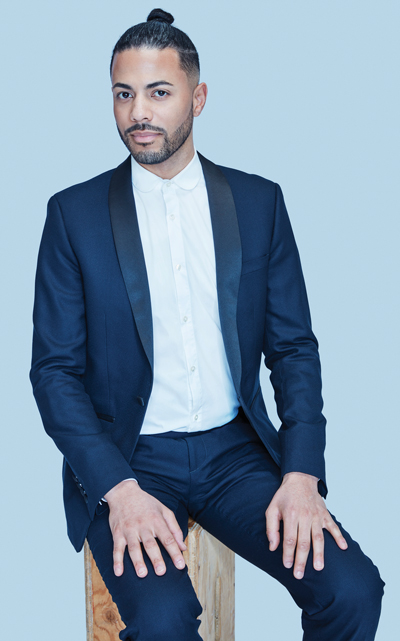Samy Moussa

Credit: Geneviève Caron
Born: 1984, Montréal, Canada
Elysium for Orchestra
- Composed: 2021
- Premiere: September 18, 2021 in Barcelona, Spain at the Basílica de la Sagrada Família by the Vienna Philharmonic, Christian Thielemann conducting.
- Instrumentation: 2 flutes, piccolo, 2 oboes, 2 clarinets, 2 bassoons, contrabassoon, 4 horns, 3 trumpets, 3 trombones, tuba, timpani, bass drum, China cymbal, crotales, crash cymbals, glockenspiel, small triangle, snare drum, tam-tam, tambour de Basque, tubular bells, vibraphone, wind gong, strings
- CSO notable performances: These are the first CSO performances of Elysium.
- Duration: approx. 12 minutes
Born in Montréal in 1984 and now based in Berlin, composer-conductor Samy Moussa is one of the world’s leading composers. His work has been performed by many of the world’s most prestigious orchestras, and he has featured as Artist-in-Residence at the Toronto Symphony Orchestra and works closely with Orchestre Symphonique de Montréal.
Regularly programmed by the world’s most prestigious orchestras, Moussa’s works have been commissioned and performed by the likes of the Wiener Philharmoniker, Bavarian Radio Symphony Orchestra, DSO Berlin, Dutch National Opera and Ballet, Dallas Symphony Orchestra and Brussels Philharmonic. The 2022–23 season saw the world premiere of his Trombone Concerto with Orchestre national de Lyon and trombonist Jörgen van Rijen, as well as the European premiere of his Second Symphony with BBC Scottish Symphony Orchestra and the BBC Proms 2023. Highlights of the 2023–24 season include the world premieres of Antigone, an oratorio for female chorus and orchestra, conducted by Erik Nielsen with Dutch National Opera and Ballet, and a new work commissioned by the Pittsburgh Symphony Orchestra to be conducted by Manfred Honneck.
In 2020, Moussa became a Laureate of the Fondation Banque Populaire; other of his honors include the 2018 Villa Massimo Fellowship, Schleswig-Holstein Musik Festival’s 2017 Paul Hindemith Prize, the Ernst von Siemens 2013 Composers’ Prize, and a 2012 Bayerischer Kunstförderpreis for his work as Music Director of INDEX Ensemble.
Moussa completed his undergraduate studies at Université de Montréal under José Evangelista and postgraduate studies at Hochschule für Musik und Theater München under Matthias Pintscher and Pascal Dusapin, undertaking masterclasses with Pierre Boulez and courses with Salvatore Sciarrino.
Following are program notes about Elysium, which is dedicated to its commissioner, the Vienna Philharmonic. It is co-commissioned by the Festival de Lanaudière, Vancouver Symphony Orchestra, BBC Scottish Symphony Orchestra and Royal Scottish National Orchestra.
Elysium: the everlasting paradise where heroes dwell. The pre-Hellenic Elysian Fields feature many of the tropes we have grown to associate with a paradisiacal afterlife, including the absence of time, an endlessly bountiful and peaceful land in which to reside, and the presence of divine beings. Its earliest reference can be found in Homer’s Odyssey, itself the earliest work of Western literature whose origins as an epic poem date back to the 8th century BCE. While Homer’s Elysium is restricted to heroes and demigods, by the 5th century BCE and the time of the pre-Socratic philosopher Empedocles, the entry requirements had relaxed somewhat to include the virtuous. This evolution reflects the changing attitudes and increasing upward mobility within the Greek city-state as well as the teachings of Empedocles himself, whose philosophy exerts a significant influence on Samy Moussa. Rather than remaining the sole preserve of the elite, immortal Elysium becomes the ultimate ethical aspiration for the common man in conjunction with a new quality of earthly life. This societal change is mirrored in the evolution of thought, ideas and the spoken word that become evident throughout what would become known as the Golden Age of classical Hellenic society.
Samy Moussa’s vision of Elysium carries Brucknerian undertones and begins with slowly shifting glissando chords leading to a leaping accompaniment motif from which a melody emerges. The accompaniment figure accelerates and the harmonic structure from the opening section returns. The music grows in waves and leads to the first climax of the piece.
Following a short transition, the initial melody-accompaniment material reappears in different orchestral coloring. A new pulse enters, growing in speed and volume until we reach the full, grandioso climax of the piece, with the glissandi from the opening ecstatically transformed. The coda makes use of the scurrying trumpet figuration from the climactic section before the accompaniment figure gradually returns, this time in a much more lyrical guise, to lead us to the conclusion of the piece.